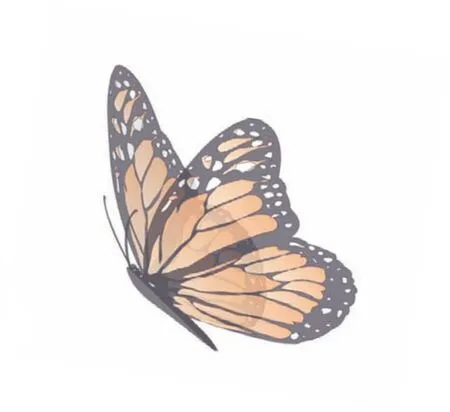北京,还有蝴蝶吗?
文/John James Wilson 译/史聪一

如同所有初到北京的人们,我很快便意识到:从任何意义上讲,北京都是一座“特大城市”。北京的人口数量在全球范围内仅次于上海。
包括明清两代王朝的兴衰史,北京的历史跨度长达两万七千余年,这也意味着北京拥有诸多文化杰作,如今,许多已列入联合国教科文组织世界文化遗产名录。这些艺术瑰宝与历史院校不仅使北京成为整个中国的艺术与文化中心,还诠释了为何包括我本人在内的许多外籍教职员工将北京视为家乡。
尽管如此,在过去的20年时间里,与许多其他中国城市及东南亚城市如出一辙,北京的城市增长与发展速度前所未有。2000年至2009年间,北京的城市用地面积翻了两番。而如今,“建成区”的面积已经占据了北京全市总面积的40%,并延伸到“京津冀”都市带。放在过去,这样的场景或许只会出现在科幻小说之中。
Like all new arrivers to Beijing, I quickly came to appreciate that Beijing is a “megacity” in every sense. The Chinese capital is the second largest city in the world by population, trailing only Shanghai.
Twenty-seven thousand years of history, including the rise and fall of the great Ming and Qing dynasties, means Beijing is home to numerous cultural masterpieces, many now recognised as UNESCO world heritage sites.The art treasures and universities have made Beijing the center of art and culture in China and explain why I, and many expatriate teaching colleagues, now call Beijing home.
Nonetheless, the speed of the urban growth and development of Beijing during the last 20 years, like many cities across China and East Asia more widely, has been unprecedented. Between 2000 and 2009, Beijing's urban land quadrupled. The “built-up” area now stretches across 40% of Beijing municipality and even further a field across the “Jing-Jin-Ji”(京津冀)metropolitan region offering an urban vastness previously only contemplated in science fiction.
自然缺失症
对于北京居民而言,无论是世居于此,还是初来乍到,都会感受到这座世界级大都市所带来的现代化都市便利:美味的食物、宏伟的景观,以及无与伦比的购物体验,但也会使人感受到远离大自然的孤独感。对于世界各地的城市居民而言,因与大自然的疏远而产生的孤立感已被公认为是一种重大的全球性挑战,这种现象则被称为“自然缺失症”(Nature Deficit Disorder)——该术语在理查德·勒夫(Richard Louv)2005年出版的《林中的最后一个孩子》(Last Child in The Woods)一书中被首次提出。
在日常生活中,同大自然的接触与否影响人类对广阔自然的感知度与鉴赏度。时常与大自然接触的人,往往对环境问题更加敏感,并对生态系统之于人类的价值与野生动物生存的权利有更积极的看法。然而,对于我这位毕生致力于野生动物研究和保护的生物学者而言,随着城市人口与土地面积的持续快速增长,自然缺失症的影响将十分令人担忧。
Nature Deficit Disorder
For residents of Beijing, lifelong and recently arrived alike, life in one of the world's largest cities provides all the conveniences of modern life: superb food,magnificent sightseeing, and great shopping, but can also trigger feelings of isolation from the natural world. The detachment from nature felt by city dwellers the world over has been recognised as a major global challenge and has become known as “Nature Deficit Disorder”,a phrase first coined by Richard Louv in his 2005 bookLast Child in the Woods.
Exposure, or lack of exposure, to nature on a day-today basis has been shown to affect people's perceptions and appreciation of the wider natural world. People regularly exposed to nature tend to be more sensitive to environmental issues and to have more positive opinions of the value of ecosystems to humans and of the right of wildlife to exist. As the urban population, as well as the urban land area, continues to increase rapidly,the implications of Nature Deficit Disorder are deeply concerning to me as a conservation biologist who has devoted my professional life to the study and protection of wildlife.
走出钢铁森林
我所教授本科班的学生们曾花去数周的时间对蝴蝶进行记录,这些蝴蝶与我们同在屋檐下,共享京北的校园。这项实地作业的目的是提高学生们对环境问题的认识,解决自然缺失症所带来的困惑。一学期下来,学生们对多达300只蝴蝶个体进行了记录,这些蝴蝶分属于10种不同类别。一些学生在不断努力地克服对昆虫的恐惧,旁人也温柔地提醒他们:蝴蝶对人类是无害的,它们既不会咬人,也不会传播任何疾病。总体来讲,许多学生终其一生都置身于城市的钢铁森林之中,对于这次经历,他们异常珍视;正如一名学生所述:“此次蝴蝶取样的经历,将成为我大学生活中一段难以忘怀的记忆。”
除去课堂内应尽的职责,我还加入了一个科学家团队:他们与我志同道合,散居于东亚与东南亚的不同城市中,对城市公园中发现的蝴蝶进行调研。同时,我们还对公园中的人群进行了采访,以断定其对蝴蝶的感知度与鉴赏水平。夏天,我从南走到北,从东走到西,足迹遍布整个北京,对京内十个公园内的蝴蝶进行了记录,并对超过两百名园内访客进行了采访。在此期间,两名学生受到先前在校园记录蝴蝶经历的鼓舞,志愿加入此次调研任务。
尽管我不能用中文交流,但通过观察学生们与园内人群间的对话,我对北京的生活有了更深的了解:因为大多数外籍人士通常被限于校园之内,或是朝阳区高档住宅的门禁之中,而这一经历使我的视野超越了上述界限。在北京,包括年轻人群与老年人群在内,公园被社会各阶层所共同使用,在天气晴朗的日子里,公园里的每一寸土地都被跳广场舞的大妈、慢跑者、野餐者、拍婚纱照的夫妇,或是仅仅享受户外生活的孩子们占据。
Going out of the concrete jungle
My undergraduate classes spent several weeks recording the butterflies which share our university campus in north Beijing. The objective of the assignment was to raise awareness about environmental issues and also address Nature Deficit Disorder. Throughout the semester the students recorded 300 individuals belonging to 10 butterfly species. Some students struggled to overcome their phobia of insects, and were gently reminded that butter flies are harmless to humans, they cannot bite and don't spread any diseases. Overall the students, many of whom have lived in the concrete jungle their whole lives,deeply cherished the experience; as one student put it: “this experience of butter flies sampling will be an unforgettable memory in my university life.”
In addition to my classroom duties I have been part of a team of like-minded scientists working across East and Southeast Asia surveying butterflies found in urban parks. We also have been interviewing parks users to determine their levels of perception and appreciation of butterflies. In summer I traversed Beijing from north to south and east to west to record the butter flies in ten city parks and interview more than two hundred park users.Two undergraduate students volunteered to assist in this task after being inspired by their experience recording butter flies on campus.
Although I cannot speak Chinese, observing the conversations between my students and the park users gave me an insight into life in Beijing beyond that seen by most expatriates con fined to their university campuses or gated communities in Chaoyang. Beijing parks are used by young and old alike from all sectors of the community,and on fine weather days every inch of the parks are occupied, by dancing aunties (guangchangwu), joggers,picnickers, couples taking wedding photos, or children simply enjoying being outdoors.
有蝴蝶吗?
还是在北京的公园内,我们共记录了31种蝴蝶,其中包括体型大而雄壮的凤尾蝶及微小的灰蝶。在很大程度上,菜粉蝶(学名Pierisrapae)是一种最为常见的蝶种,也是我们在调查的十个公园都发现的唯一一个蝶种。这种白色的蝴蝶遍布于世界各地的城市中,在离北京8000公里的地方——我的家乡英格兰西北部,这种蝴蝶也随处可见。每年2月至10月,幼年的菜粉蝶会在北京四处纷飞。而在一年之中,第一批蝴蝶的体型比后来的成年蝴蝶要小,这可能是由于蝶蛹在地下越冬的影响;这一特点是我们在校园里记录蝴蝶发现的。
在大城市中,城市公园与大学校园拥有令人意想不到的生物多样性,以及种类繁多的野生动物,这或许会让许多人感到惊讶。事实上,在策划校园蝴蝶调查时,同事们经常会发出这样的疑问:“校园里有蝴蝶吗?”城市里的野生动物并不总是显而易见的,如果我们不花时间去仔细观察,那么我们这些城市居民通常很难注意到它们。
Are There Butter flies?
We recorded thirty-one species of butterflies in Beijing parks, including large and spectacular swallowtails and teeny-tiny grass blues. The small white (known by the scientific name Pierisrapae) was the most common species by a large margin and was the only species found in all ten parks we surveyed. This white butter fly can be found in cities all over the world, and is abundant in my hometown in Northwest England, 8000 kilometres from Beijing. Adult small white butter flies can be seen flying in Beijing from February until October each year. The first butterflies of the year are of smaller size than the later adults, probably due to the effects of overwintering underground as pupae;a pattern noticed by the students recording the butter flies at our campus.
It may come as a surprise to many that the urban parks and university campuses in megacities, can host remarkable levels of biodiversity and abundant wildlife.In fact, when planning the campus butterfly survey,colleagues would frequently ask: “There are butter flies on campus?” Urban wildlife may not always be obvious, and we city dwellers often fail to notice it if we don't take the time to look carefully.

John James Wilson,英国,动物学博士学位,曾任中国农业大学国际学院生物课教师。图为John James Wilson(前)和学生在一起(中国农业大学国际学院供图)
“虚假的”蝴蝶展
目前,虽然北京的蝴蝶数量庞大且种类繁多,但蝴蝶在城市中仍面临着诸多挑战,其在城市的长期续存还远远没有得到保障。在过去的50年里,英国乡村蝴蝶的消失已让人们扼腕叹息。然而,最近的一项研究表明:蝴蝶在英国城市中的消失速度比在乡村地区更加迅速。
城市化进程导致了绿地的丧失与碎片化,使得蝴蝶的觅食难度不断增加。对于菜粉蝶这样的蝶种而言,它们能够以诸多不同种类的植物为食,或许可以应对此类情况,但对于那些飞行能力不强,同时又不太可能寻找到全新食物来源的蝶种而言,在城市生存中的处境正变得举步维艰。由于城市中的热岛效应,全球变暖导致的气温上升在市区内尤为明显,因而那些在寒冷的冬季处于繁盛的蝴蝶,或将会受到严重影响。此外,城市中密集的交通流量导致了氮沉积水平的增加,这不仅改变了植物的营养质量,还与蝴蝶的减少息息相关。
英国广播公司(BBC)新闻网站曾有一条新闻:对于“虚假的”蝴蝶展,中国游客愤怒至极。据新闻报道,广西的游客们期待一睹蝴蝶展,但当他们意识到自己购买了门票,却只能看到粘在树枝上的塑料蝴蝶时,感到失望透顶。而在我看来,这个故事表明了中国人对与蝴蝶的互动颇为重视,甚至愿意为它们埋单。也许这里的人们并没有意识到:在城市公园内,他们很容易做到与许多美丽的蝴蝶进行互动,而这一切往往又是免费的。因此,让我们携起手来,提升人们保护本地野生蝴蝶的意识,让它们与我们同处一屋檐之下,并采取措施,让我们真正成为“一家人”。
“Fake” butter fly exhibition
While there are currently diverse and abundant assemblages of butter flies in Beijing, butter flies in urban areas face many challenges and their continued presence in the city is far from guaranteed. The disappearance of butterflies from the British countryside over the past 50 years has been well-documented, but a recent study has demonstrated that butterflies are vanishing from British cities more quickly than from rural areas.
Urbanisation causes the loss and fragmentation of green spaces which makes it harder for butterflies to find food. Species like the small white, which can feed on many different types of plants, can probably cope, but species that aren't as strong fliers and are less able to find new food sources increasingly struggle with city life.Temperature increases due to global warming are more strongly pronounced in cities due to the urban heat island effect and butter flies which thrive during cold winters are likely to be severely affected. The high volumes of traffic in cities leads to increased levels of nitrogen deposition which changes the nutritional quality of plants and has been linked to butter fly declines.
“Chinese visitors left furious by ‘fake' butter fly exhibition”was a headline on the BBC News website. According to the news report, visitors in Guangxi hoping to see an exhibition of butter flies were disappointed after realising they had bought tickets to see plastic butter flies attached to sticks. To me, this story shows that Chinese people value interactions with butterflies and are even willing to pay for them. Maybe they don't realise they can easily interact with many beautiful butter flies in their city parks,often free of charge. Let's raise awareness about the wild,native butterflies sharing our cities, and take steps to ensure they continue to have a home among us.

